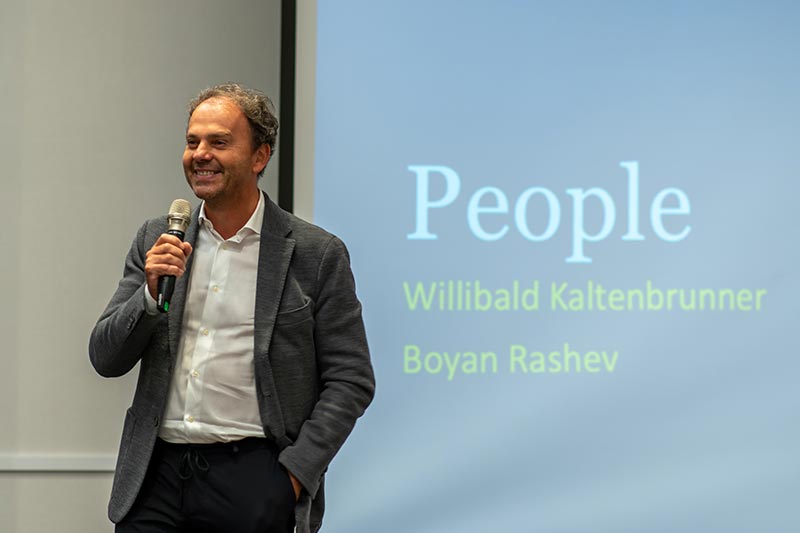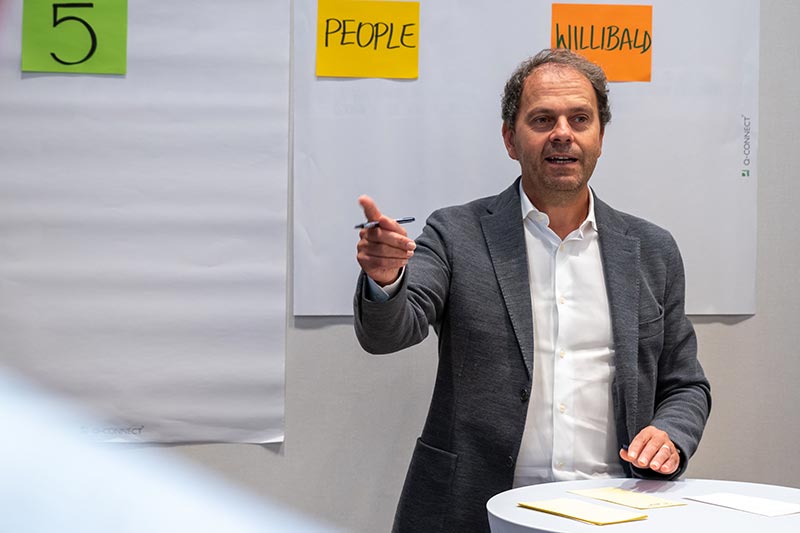Dear Willibald, as a managing partner and long-time team member, you are a familiar face at denkstatt. For 25 years now, you have been supporting and shaping the developments of the company. You are particularly known for your closeness to denkstatt’s clients, for whom you are often the first point of contact, for example when it comes to initial inquiries or projects. Based on your observations, what challenges do companies currently face regarding sustainability?
Willibald Kaltenbrunner: The biggest challenge is certainly that the topic of sustainability is increasingly evolving from a trend, as it was originally viewed by many, to an integral part of business. For example, we are seeing tendencies for sustainability departments to dissolve in more and more companies and for expertise to migrate to individual departments. As a result, more and more knowledge about sustainability is required in functions such as manufacturing or procurement. And that leads to an even greater challenge. Because sustainability knowledge must influence all processes. In the past, it was enough to have one, or in the best case, a few people in the company who were responsible for sustainability agendas. But sustainability has become such a complex issue that companies simply have to think differently. And managing to do that is a major achievement.
Immediately following on from this, what are those doing right who are creating precisely this anchoring of sustainability in the organization and in the processes?
In my view, there are two aspects to this. Firstly, companies that succeed in doing this have usually been dealing with the issue of sustainability for many years. They have already been on a longer journey, which was also necessary to steer the organization in this direction. Second, these companies have an extremely strong clarity about why they are doing all this and what benefit they are getting from it. And that benefit can show up in different dimensions, such as cost benefits, or a better financial structure in general. Their own reputation or attractiveness as an employer are also among the benefits that these companies have identified for themselves. Moreover, they succeed in spreading this clarity internally so that everyone knows what they are contributing to and then skillfully convey this to the outside world.
What do these developments mean for sustainability consulting?
If we look way back now – maybe 15 or 20 years into the past – we used to say that we went to one of the last corners of the company when we were on-site with clients. The issue of sustainability was just so irrelevant. It wasn’t a priority. We then worked more and more with the EHS departments. In the meantime, however, the topic has become so relevant that our contacts are on the first or second management level. Of course, other issues are dealt with there. Concepts and proposals are also scrutinized far more critically and questioned more. Quality has always been our claim, but today we need different discussions and arguments to convince people of the merits of our proposals.
And what we can also observe: The complexity in consulting is increasing, especially when it comes to processes. Because now we not only have the sustainability departments as a point of contact on the client side, but also work directly with the experts from the individual specialist departments in the projects. For this, we had to expand expertise in denkstatt and build up know-how in these specialist areas – this will also be our task in the future. At the same time, we score points with our many years of experience in the field of sustainability. This is very much appreciated by the people in the individual departments, who perhaps don’t have as much previous knowledge in this area. All in all, this complements each other very well.
But what all these developments clearly show, and I very much welcome this: Things are really changing now. Sustainability is suddenly becoming part of the corporate strategy. We see that products and processes are actually changing. And being part of that is a great feeling and it’s just fun to see the impact we’re creating together.
For what reasons do companies make use of denkstatt’s consulting services? What changes can perhaps be observed here over the years?
I believe the reasons why sustainability consulting is requested have hardly changed. In my view, there are still two: know-how and resources. Many clients come to us because they don’t want to reinvent the wheel. Our routine in handling sustainability projects and our years of experience are fundamental arguments here. Other clients lack the necessary resources for certain projects, which they therefore outsource to us. What has changed in the meantime, however, are the market requirements. There are compliance requirements popping up that a client suddenly has to meet. The client’s customer is constantly knocking and expecting a change. End users are asking critical questions. Then, of course, there are the rating agencies, financiers, and investors. The pressure from all sides is increasing, and this helps to boost motivation to tackle sustainability issues.

What industry-specific trends can you identify?
What we can see above all are the changes in the entire financial service industry. Regulatory developments are having an enormous impact on the industry. For example, the calculation and reduction of financed emissions play a major role. This means that companies in the financial sector have to look at how their financial flows contribute to reducing greenhouse gas emissions. As a result, a great deal has happened within the industry.
Due to the multiple crises and the developments of the last few years, the energy sector has to deal with special challenges. And this, of course, has an impact on all other industries as well. Energy-intensive industries are particularly affected by rising energy prices.
In my view, the retail sector has a very strong and special role to play in terms of sustainability. After all, companies in this sector are at an important lever for sustainable development and sometimes position themselves as pioneers when it comes to implementing sustainability agendas. At the same time, the retail sector is of great importance to consumers. When I think about it, there is a special closeness between the food and beverage sector and people. Food is simply the basis of life. What we eat is also very personal. In that respect, this is an exciting industry for me. Consumers are often an important driver here, which leads to its own dynamics and favors work on sustainability issues. That’s why, in my experience, they are often already a step ahead of companies in other industries.
For many companies, sustainability is also a competitive aspect that strengthens their own positioning within the industry. What differences are there compared to the last decades?
Now the tools and methods are much clearer than they were 15 years ago. That is an important difference. Let’s take the Greenhouse Gas Protocol. The content is highly complex, but it creates clarity about what needs to be done. Fifteen years ago, there were no Science-Based Targets either. Now, there is a standard available to everyone that specifies the targets and can be broken down into steps for implementation. Thanks to these many tools and methods, we have a completely different basis today than we did 15 years ago. For companies, this means that competition for the best sustainability performance is increasing and differentiation is no longer as easy as it used to be.
Let’s take a look at the Dow Jones Sustainability Index. The top 5 companies know each other inside out. Every point on the way to first place is at stake. It’s a neck-and-neck race. That doesn’t mean that positioning oneself in relation to the competition no longer works. Quite the opposite. But companies have to take a close look at their effects in order to find their own path, which then has to be science-based at the same time. Positioning then succeeds via new topics, such as biodiversity management. Anyone who deals with this can still stand out well from the competition. And our job at denkstatt is to advise and support our clients in these aspects as well.
Speaking personally: How do you experience sustainability consulting?
Sustainability consulting is simply incredibly exciting and instructive, but also demanding. It wasn’t always easy for me either. But when I think back, I learned the most in the projects that were the most challenging and perhaps also hurt a bit. In such situations, incredible personal development is possible. At least that’s how I experienced it. Over the years, I have learned to distinguish myself well in my role as a consultant. I think that’s very important so that the job is fun and you can do it for so long. In any case, you need a sense of adventure, and I think a personal interest in learning new things can’t hurt either. That’s how I’m wired as a person, for example, and these qualities have certainly helped me over the years at denkstatt.
The shared sense of achievement with clients is also absolutely motivating for me. However, the experience of these moments has changed. Projects are often handled online, including project completions. The sense of achievement is there, of course, and we are more efficient because of this way of working, but the personal moments with each other are missing sometimes. Here I would like to see us focus more on shared moments again and have them happen more often. I believe this is essential for our own motivation and also for the experience of our clients. I also believe that celebrating successes with the entire project team is crucial for our employees. It’s an important component for retaining the joy of working.

When you think of all the years you’ve now spent at denkstatt: What are you proud of?
I’m proud that we are the way we are. And proud that we have such a cool drive as a team. We have our own spirit and momentum and you can see that from the outside. That helps us succeed and attract talent that wants to be part of our team. Even when we participate in international conferences, no matter where in Europe, denkstatt is a household name. Christian Plas has done something special there. What we can now look forward to at denkstatt is something we have worked hard for over the last 30 years. We can be proud of that.
A nice closing word. Thank you for the interview.
Thank you very much.
